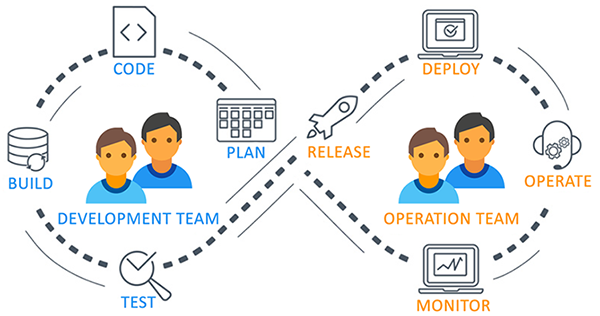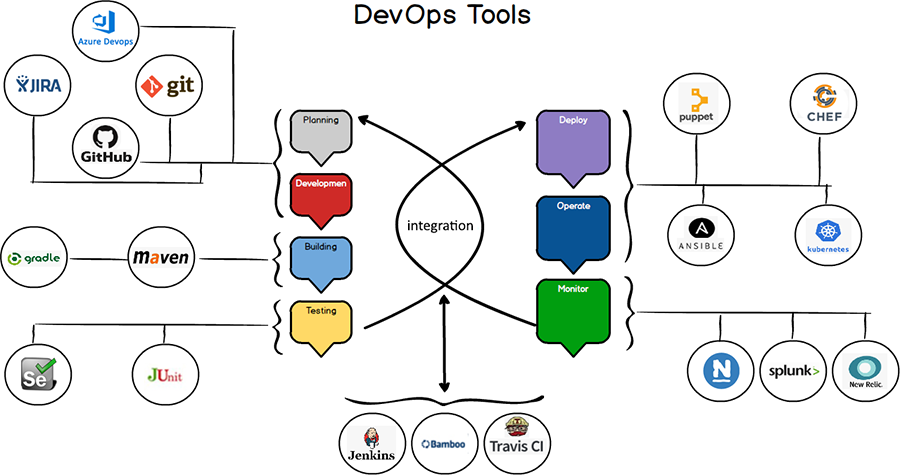What is DevOps
DevOps is Development and Operation’s Collaboration, It’s a Union of Process, People and Working Product that enable continuous integration and continuous delivery of value to our end users. DevOps accelerate the process to deliver applications and software services at high speed and high velocity. So that organizations can learn and Adopt the market at its earliest. Also, it minimizing the risk factor by continuously delivering and getting end-users and stakeholders feedback at the early stages.

How DevOps Works
DevOps is the practice of operations and development engineers that work together in the entire project lifecycle, from design and development process to production releases and support.

Starting from design and development to testing automation and from continuous integration to continuous delivery, the team works together to achieve the desired goal. People having both development and operations skill sets working together and use various tools for CI-CD and Monitoring to respond quickly to customers need and fix issues and bugs.
Benefits of DevOps
Following are the main benefits of DevOps Practices.
Break down the Silos
I believe the most important benefit using DevOps is to break down the Silos as the Cross-functional development team and operation team works together that is possible due to the self-organized approach of work.
Speed
Delivering the highest business value item quickly and faster product delivery in the market as DevOps follows Agile Principles.
Rapid Delivery
Frequently release the working product in the market to satisfy the market and more importantly customers need, that improves the ROI (Return on investment).
Reliability
By following DevOps best practices and using the best tool for Continuous Integration, Testing Automation, and Continuous Delivery and monitoring the logs helps the team to stay updated and take the real-time decision quickly.
Team Collaboration
DevOps improves the collaborations between the Dev Team and Ops Team, Team works together towards the common business goal. DevOps Break the silos and focus on Communication, Transparency, Inspection, Adaption, and Integration.,/p>
Security
While implementing automation Security is a very important factor, By Following DevOps model and using Infrastructure as code and by doing automation of process and compliance policies, one can take control security configuration.
Risk Management
Using this practice we can Identify the risk factor early in the application lifecycle stages. Early detection of any issues or bug and quick correction or fixes helps to stay ahead in the competition.
Why DevOps Matters
In today’s competitive software Industry, Automation and AI plays a major role and to stay ahead in the market and attract your stakeholders and customer we must transform and adapt the DevOps Best Practices. So Why you need DevOps in First place, Well
To stay ahead in the market as competitors are already doing this.
To increase velocity of the team as well as product delivery.
To reduce downtime and within a minimum time limits, update the changes on the production.
To reduce human error by doing all work automated.
DevOps Model Adaption
In any company the transformation from Waterfall to Agile and Agile to DevOps we first must work on the people’s mindset as I Explain that it is not a job or tool but it is a mindset. The team must work together and make their communication smooth, work more collaboratively and take the responsibilities to achieve the goal. The team must trust each other and maintain transparency. Second important things are to identify the tools that best suit for your project in terms of planning, code management, testing automation, continuous integration, continuous deployment and monitoring and start using that you can also go for Infrastructure as Code, to sum up, automate everything you can.
DevOps Tools
Following are the categories and Tools using that you can manage DevOps Practices.
Planning : You can use Jira or Azure DevOps Board for manage and plan your work in an Agile way.
Development : For code management, Git is the number 1 tool to manage your Code version History, branches, Push and Pull mechanism as a distributed way. You can also use Microsoft TFVC (Team Foundation Version Control) which is a Centralized version control system.
Testing : For automate your testing you can relies on Selenium, JUnit and Apache JMeter.

Build, Deploy and Integration
For Integration we can relays on Jenkins, Travis CI or Bamboo, to manage your application builds and based on your application need we can use Maven or Gradle for Building and accelerating development and productivities. You can also go for Docker, Kubernetes, Chef, Ansible, and Puppet which are very famous tools for the deployment.
Operating and Monitoring
Once your product is in right place, Operating and continuous monitoring play a major role here, and for that, we can use Nagios, Splunk or New Relics. Using that one can manage Servers Networks and Application.

No comments:
Post a Comment